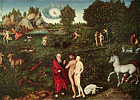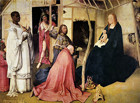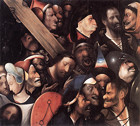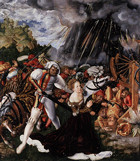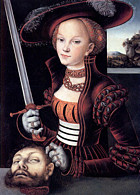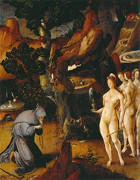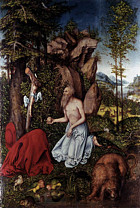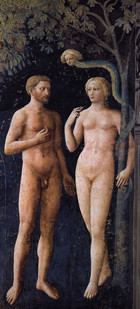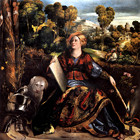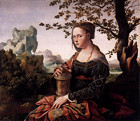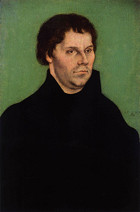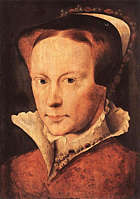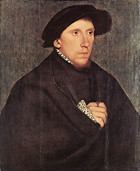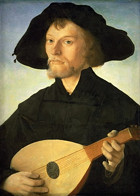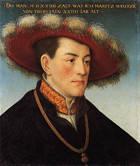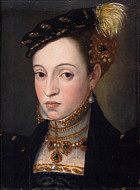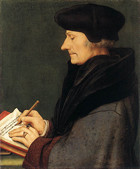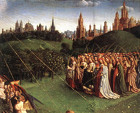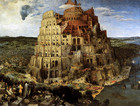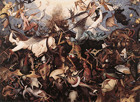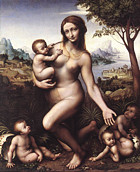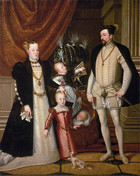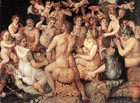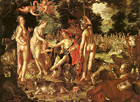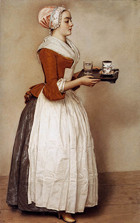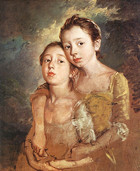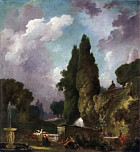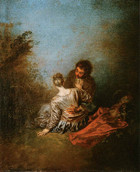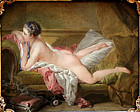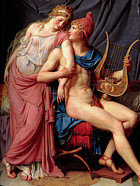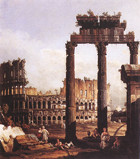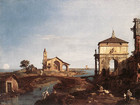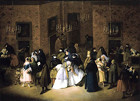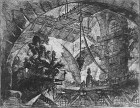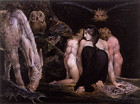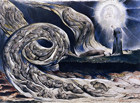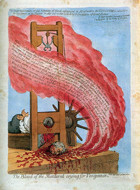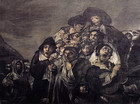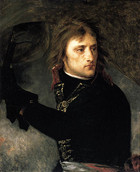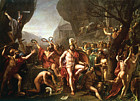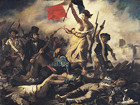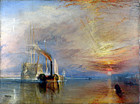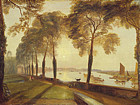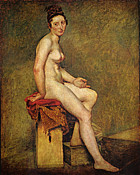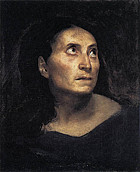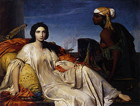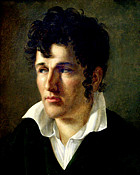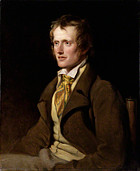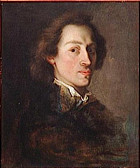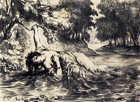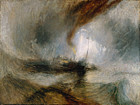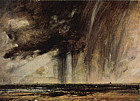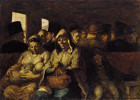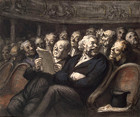A New Book of Verse
A New Book of Verse
Begun by John Fraser (1928–2023) and Donald E. Stanford (1913–1998).
Developed for the Web by John Fraser.
For various types of poems in the anthology see Groupings.
For a foretaste of the contents, see Sampler.
For background and editorial principles, see Introduction.
Table of Contents
Too many links to other sites having become unsatisfactory, the link symbol ![]() and the underlined links are now reserved for the 605 poems that were transcribed for this site.
and the underlined links are now reserved for the 605 poems that were transcribed for this site.
Geoffrey Chaucer (ca 1343–1400)
Your eyen two will slee me sodenly
To Rosemounde (“Madame, ye been of alle beautee shrine”)
Hyd, Absalon, thy gilte tresses clere (Balade)
Truth (“Flee fro the prees and dwelle with soothfastnesse”)
Gentilesse (“The firste fader and findere of gentilesse,”)
Robert Henryson (1424?–1506?) - Note
The Complaint of Cresseid (“O! sop of sorrow, sonkin into cair.”)
François Villon (1431–?)
Ballad of Ladies of Times Past / Ballade des Dames du Temps Jadis (“Dictes-moy où, n'en quel pays”/ “Tell me where, in what land”)
Ballade of the Hanged / Ballade des Pendus (“Freres humains qui après nous vivez”/ “O brother men who live on after us”) French English
Rondeau: (“Mort, j’appelle de ta rigueur” / “Death, I appeal against your harshness”)
The Lament of the Once Beautiful Armouress / Les Regrets de la Belle Héaulmiere (“Advis m’est que j’oy regreter”/ “Now I think I hear the regrets”)
Ballade: the Reply to Franc Gontier / Ballade: les contradits de Franc Gontier (“Sur mol duvet assis, un gras chanoine,”/ “A plump cannon lounging on an eiderdown.”) French English
Anonymous
Watching his lady in the morning / En voyant sa dame au matin (ca 1489). French and English
William Dunbar (ca 1460–ca 1525)
Lament for the Makaris (“I that in heill was and gladness”)
Done is a Battle (“Done is a battle on the dragon black”)
Sweit rois of vertew and of gentilnes
To the Merchantis of Edinburgh (“Quhy will ye, merchantis of renoun”) ![]()
Meditatioun in Wyntir (“In to thir dirk and drublie dayis”) ![]()
On the Nativity of Christ (“Rorate celi desuper!”) ![]()
William Dunbar and Walter Kennedy (c.1455–1518?
The Flyting of Dunbar and Kennedy (“Schir Johine the Ros, ane thing thair is compiled”)
Thomas More (1478–1535)—Note
A Lamentation of Queen Elizabeth (“O ye that put your trust and confidence”) ![]()
Anonymous - Note
Westron wynd, when wyll thou blow
I sing of a maiden
Of all wemen that ever were borne ![]()
In a valey of this restles mynde
Thomas Wyatt (ca. 1503–1542)
They flee from me, that sometime did me seek
Tagus, farewell, that westward with thy streams
Is it possible?
Whoso list to hunt, I know where is an hind
Madam withouten many words
My lute, awake, perform the last
Once, as me thought, Fortune me kissed
You that in love find luck and habundance
What means this? When I lie alone
Alexander Scott (1520–158?) - Note
Lament of the Maister of Erskyn ![]()
Ann Askew (1521–1546) - Note
The Ballad Which Anne Askew Made and Sung When She Was in Newgate (“Like as the armed knight”)
William Forrest (dates?) Note
A New Ballade of the Marigolde (“The God above, for man’s delight”) ![]()
Joachim du Bellay (1522–1560)
From a Winnower to the Winds / D’un Vanneur de Blé aux Vents (“A vous troupe légère”/ “To you, airy flock,”)
Pierre de Ronsard (1524–1585) - Note
When you are very old, in evening candlelight / Quand vous serez bien vieille, au soir, par la chandelle
Marie, get up, my lazy little one / Marie, levez-vous, ma jeune paresseuse
Song / Chanson (“Douce Maistresse touche”/ “Sweet Mistress, touch”) French English
On these long winter nights when the lazy moon / Ces longues nuits d’hiver, où la Lune ocieuse French and English
From a Courtesan to Venus / D’une Courtizanne à Venus (“Si je puis ma jeunesse folle” / “If my wanton youth can be certain”) French English
O Love, I’m not complaining about the arrogance / Amour, je ne me plains de l’orgeuil endurcy French and English
O long winter nights, bane of my existence / Ah longues nuits d’hiver, de ma vie bourrelles English
George Gascoigne (ca. 1528–1577
Of all the birds that I do know ![]()
The Lullaby of a Lover (“Sing lullaby, as women do”)
Gascoigne’s Woodmanship (“My worthy Lord, I pray you wonder not”)
Elizabeth Tudor (1533–1603)
On Monsieur’s Departure (“I grieve; and dare not show my discontent!”)
Barnabe Googe (1540–1594)
Give money me, take friendship whoso list
O raging seas and mighty Neptune’s reign
Alexander Montgomerie (b. ca 1543–1558; d. 1598)
The Night is Neir Gone (“Hay! Now the day dawis”) ![]()
The Secreit Prais of Love(“As everie object to the outward ee”) ![]()
A Godly Prayer (“Peccavi Pater, Miserere mei.”) ![]()
John Stewart (ca.1545–ca. 1605)
To the Honour of the Ladyis, and the Fortification of their Fame (“Just to declair the hie Magnificence”) ![]()
Christofle de Beaujeu (1552?–1635?)
It’s a curious law that permits putting / C’est une estrange loy de souffrir que l’on couche. French and English
Walter Raleigh (ca. 1552–1618) - Note
The Lie (“Go, soul, the body’s guest”)
What is our life? A play of passion
Even such is time, that takes in trust
The Passionate Man’s Pilgrimage (“Give me my scallop shell of quiet”)
Three things there be that prosper up apace ![]()
Edmund Spenser (1552–1599)
Epithalamion (“Ye learned sisters, which have oftentimes”)
Philip Sidney (1554–1586)
Leave me, O Love, which reaches but to dust
Ring out your bells, let mourning shows be spread
Only joy, now here you are
Who hath his fancy pleased
Who is it that this dark night
Fulke Greville (1554–1628)
All my senses, like beacons flame
I with whose colors Myra dressed her head
Down in the depth of mine iniquity ![]()
Sion lies waste
The Earth with thunder torn, with fire blasted
In night when colours all to black are cast
Anonymous
Ay Me, Ay Me, I Sigh the Scythe Afield (“Ay me, ay me, I sigh to see the scythe a-field.”)
Lady Anne Bothwell’s Lullaby (“Balow, my Boy, ly still and sleep”) ![]() Note
Note
Jean-Édouard Monin (1557–1586)
To Her Thighs / Au Cuisses (“Quoi? bessons pilotis, quoi? gemelle colonne” / “What?—foundations of legs? What? —twin columns?”) French and English
George Peele (ca. 1558–1597)
His golden locks time hath to silver turned
Bethsabe’s Song (“Hot sun, cool fire, tempered with sweet air”) ![]()
When as the rye reach to the chin ![]()
Chidiock Tichborne (ca. 1558–1586)
My prime of youth is but a frost of cares
Anonymous
For the Lute of a Young Lady / Pour le Luth d’une Demoiselle (“If your delicate white hand” / “Sy vostre main blanche et legere”) French and English
Héliette de Vivonne (1558–1625)
The Lute / Le Luth (“For the sweetest enjoyment that I can choose”/ “Pour le plux doux esbat que je puisse choisir”) French and English
F.B.P.
Mary Herbert (1561–1621)
Domine probasti: Psalm 139 (“O Lord in me there lieth nought”)
Samuel Daniel (1562–1619)
Care-charmer sleep, son of the sable night
Let others sing of knights and paladins
Mark Boyd (1563–1601)
Fra bank to bank, fra wood to wood I rin
Michael Drayton (1563–1631)
How many paltry, foolish, painted things
Since there’s no help, come, let us kiss and part
Christopher Marlowe (1564–1593)
In Summer’s Heat (“In summer’s heat and mid-time of the day”)
William Shakespeare (1564–1616)
Tired with all these, for restful death I cry
That time of year thou may’st in me behold
Thy glass will show thee how thy beauties wear
Let me not to the marriage of true minds
The expense of spirit in a waste of shame
Since brass, nor stone, nor earth, nor boundless sea
Poor soul, the center of my sinful earth
Fear no more the heat o’ the sun
Roses, their sharp spines being gone
O mistress mine, where are you roaming?
Thomas Nashe (ca. 1567–1601)
Adieu, farewell earth’s bliss
Autumn hath all the summer’s fruitful treasure
Thomas Campion (ca.1567–1619)
Now winter nights enlarge
Follow your saint, follow with accents sweet
When thou must home to shades of underground
Whether men do laugh or weep
Jack and Joan they think no ill ![]()
A secret love or two, I must confess ![]()
Robert Ayton (1570–1638)
To an Inconstant One (“I loved thee once; I’ll love no more”) ![]()
The Exercise of Affection (“There is no worldly pleasure here below”) ![]()
Ben Jonson (ca. 1572–1637)
On My First Son (“Farewell, thou child of my right hand, and joy”)
To Heaven (“Good and great God! Can I not think of thee”)
Let it not your wonder move
Though beauty be the mark of praise
Queen and huntress, chaste and fair
An Ode to Himself (“Where dost thou careless lie”)
My Picture Left in Scotland (“I now think Love is rather deaf than blind”)
“To draw no envy, Shakespeare, on thy name”
Inviting a Friend to Supper (“Tonight, grave sir, both my poor house, and I”)
The Goodwife’s Ale (“When shall we meet again and have a taste”) ![]()
Mathurin Regnier (1573–1613)
Abridged Confession / Abrégé de Confession (“Puisque sept péchés de nos yeux”/ “Since seven sins, from our eyes,”) English
Madrigals and Lute Songs
Thomas Morley (ca 1557–1602)
John Mundy (ca 1560–1602)
In midst of woods or pleasant grove
John Dowland (1563–1625)
Fine knacks for ladies, cheap, choice, brave and new
Weep ye no more, sad fountains
Come away, come, sweet love
John Danyel (1564–1626)
If I could shut the gate against my thoughts
Philip Rosseter (1567–1623)
Come, let us sound with melody the praises
Thomas Bateson (ca 1570–1630)
I heard a noise and wishèd for a sight
Martin Peerson (ca 1571–1650)
Thomas Vautor (1579–1620)
Sweet Suffolk owl, so trimly dight
Orlando Gibbons (1583–1625)
The silver swan, who living had no note
Robert Jones (?–?)
How many new years have grown old
Anonymous
John Donne (ca. 1572–1631)
The Sun Rising (“Busy old fool, unruly Sun”)
Going to Bed (“Come, Madam, come, all rest my powers defy,”)
The Apparition (“When by thy scorn, O murd’ress, I am dead”)
Twicknam Garden (“Blasted with sighs and surrounded with tears”)
A Valediction: of My Name, in the Window (“My name engraved herein”)
Good Friday, 1613, Riding Westward (“Let man’s soul be a sphere, and then, in this,”)
Thou hast made me, and shall thy work decay?
At the round earth’s imagined corners, blow
Batter my heart, three personed God
Hymn to God, My God, in my Sickness (“Since I am coming to that holy room”)
John Webster (ca.1580–ca.1630)
Hark! Now everything is still
Call for the Robin-redbreast and the Wren
Anonymous
An Old Souldier of the Queens (“Of an old Souldier of the Queens”) ![]()
Whipping Cheare (“Come you fatal Sisters three”) ![]()
An Excellent New Medley (“When Philomel begins to sing”) ![]() Note
Note
Anonymous
The Maid Would Give Ten Shillings for a Kiss (“You young men all take pitty on me”) ![]()
The Souldiers Farewell to his Love ( “Margaret my sweetest, Margaret I must go”) ![]()
The Lamentation of a New Married Man (“You Batchelors that brave it”) ![]()
Phillida Flouts Me (“Oh! what a plague is Love! How shall I bear it?”) ![]()
The Wooing Rogue (“Come live with me and be my Whore”) ![]()
Edward Herbert (1583–1640)
Elegy over a Tomb (“Must I then see, alas! Eternal night”)
Louise-Marguerite de Lorraine, Princesse de Conty (1588–1631)
Stanzas in Which a Lady Speaks / Stances où une Dame Parle (“I’m fond of those portraits drawn on whitewashed walls” / “J’ayme bien ces pourtraits au blanc de murailles”) French and English
Théophile de Viau (1590–1626)
Sonnet / Sonnet (“Je songeois que Phyllis des enfers revenue” / “I dreamed that Phyllis, returning from the shades”) French and English
Stanzas / Stances (“Quand tu me vois baiser tes bras,”/ “When you see me kiss your arms,”) English
A raven croaks ahead of me / Un corbeau avant moy croasse. French and English
Sonnet / Sonnet (“Phyllis, tout est foutu, je meurs de la verole” / “Phyllis, I’m all fucked up, I’ve got the pox.”) French and English
Satire / Satyre (“On m’a dit que ma soeur chevauche” / ”They say my sister screws on top”) French and English
Anonymous
Sir Walter Raleigh’s Lamentation ![]()
A Prognostication on Will Laud, Late Archbishop of Canterbury (“My little lord, methinks ’tis strange”) ![]() Note
Note
A Satyre entitled the Witch (“Shee with whom troopes of Bustuary slaves”) ![]() — Note
— Note
Robert Herrick (1591–1674) - Note
The Vine (“I dreamed this mortal part of mine”)
Corinna’s Going A-Maying (“Get up, get up for shame, the blooming morn”)
Now is the time for mirth
To Anthea, who may command him anything (“Bid me to live, and I will live”)
To Meadows (“Ye have been fresh and green”)
An Ode for Ben Jonson (“Ah Ben!”)
A Psalme or Hymn to the Graces (“Glory be to the Graces!”) ![]()
His Litany to the Holy Spirit (“In the hour of my distress”)
The White Island: or Place of the Blest (“In this world (the Isle of Dreams)”) ![]()
Henry King (1592–1669)
The Exequy (“Accept thou Shrine of my dead Saint”)
George Herbert (1591–1674)
Affliction (“When first thou didst entice to thee my heart”)
The Temper (“How should I praise thee, Lord? how should my rhymes”)
Jordan (“Who says that fictions only and false hair”)
Church Monuments (“While that my soul repairs to her devotion”) ![]()
Virtue (“Sweet day, so cool, so calm, so bright”)
Mortification (“How soon doth man decay!”)
The Quip (The merry world did on a day”)
The Flower (“How fresh, O Lord, how sweet and clean”)
The Forerunners (“The harbingers are come. See, see their mark”)
Francis Quarles (1592–1644)
Why dost thou shade thy lovely face? ![]()
Are Not My Days Few? (“My glass is half unspent: Forbear to arrest”)
Thomas Carew (1595–1640)
Song: When June is past, the fading rose (“Ask me no more where Jove bestows”)
To a Lady that Desired I Would Love Her (“Now you have freely given me leave to love”)
An Elegy upon the Death of the Dean of St. Paul’s, Dr. John Donne (“Can we not force from widow’d poetry”)
A Rapture (“I will enjoy thee now, my Celia, come”)
Robert Sempill (1595?–1665?) - Note
The Life and Death of the Piper of Kilbarchan (“Kilbarchan now may say, alas!”) ![]()
Edmund Waller (1606–1687
Go, Lovely Rose
Thomas Ford (ca. 1607–1648)
There is a Lady sweet and kind
John Milton (1608–1674)
When I consider how my light is spent
To the Lady Margaret Ley (“Daughter to that good Earl, once President”)
On the Late Massacre in Piedmont (“Avenge, O Lord, thy slaughter’d saints, whose bones”)
John Suckling (1609–1642)
Why so pale and wan, fond lover?
A Ballad Upon a Wedding (“I tell thee Dick where I have been”)
Anne Bradstreet (ca. 1612–1672)
To My Dear and Loving Husband (“If ever two were one, then surely we.”)
Before the Birth of One of Her Children (“All things within this fading world hath end,”)
The Prologue (“To sing of wars, of captains, and of kings”)
Francis Sempill (1616?–1686) - Note
The Blythsome Wedding (“Fy let us all to the Briddel”) ![]()
Abraham Cowley (1618–1667)
On the Death of Mr. William Harvey (“It was a dismal, and a fearful night”) ![]()
Richard Lovelace ((1618–1658)
To Lucasta, Going to the Wars (“Tell me not, sweet, I am unkind”)
To Althea, from Prison (“When Love with unconfined wings”)
La Bella Bona-Roba (“I cannot tell who loves the skeleton”) ![]()
François de Maucroix (1619–1708)
To His P---k / Contre Son V[it] (“Je ne puis plus bander le jour”/ “I’m no good any more by day”). French and English
Andrew Marvell (ca.1621–1678)
The Garden (“How vainly men themselves amaze”)
To His Coy Mistress (“Had we but world enough, and time”)
The Mower to the Glow-Worms (“Ye living lamps, by whose dear light”)
Henry Vaughan (1622–1695)
The Lamp (“‘Tis dead night round about: Horror doth creep”)
Friends Departed (“They are all gone into the world of light!”)
The Retreat (“Happy those early days, when I”)
To His Books (“Bright books! The perspectives to our weak sights”)
Margaret Cavendish (1623–1673) - Note
Upon the Theme of Love (“O Love, how thou art tired out with Rhyme!”) ![]()
John Bunyan (1628–1688)
My Little Bird (“My little Bird, how canst thou sit”) ![]()
Walter Pope (1628–1714)
The Old Man’s Wish (“If I live to be old”)
John Dryden (1631–1700)
Mac Flecknoe (“All human things are subject to decay”)
To the Memory of Mr. Oldham (“Farewell, too little and too lately known”)
I Feed a Flame Within (“I feed a flame within, which so torments me”)
Song: Can Life Be a Blessing? (“Can life be a blessing”)
A Song to a Fair Young Lady going out of Town in the Spring (“Ask not the cause why sullen Spring”)
Song (“Farewell ungrateful traitor”)
Katherine Philips (1631–1664)
To My Excellent Lucasia, on Our Friendship (“I did not live, until this time”)
A Prayer (“Eternal reason, glorious majesty”) ![]()
To Mrs. Mary Awbrey (“Soul of my soul, my joy, my crown, my friend,”) ![]()
Wiston Vault (“And why this vault and tomb? Alike we must”) ![]()
Orinda to Lucasia (“Observe the weary birds, e’er night be done”) ![]()
Thomas Traherne (1637–1674)
On News (“News from a foreign country came”)
The Salutation (“These little limbs”) ![]()
Claude Le Petit (1638–1662)
Sonnet on the Death of Chausson / Sonnet sur la Mort de Chausson (“Amis, on a brûlé le malheureux Chausson” / “Friends, they have burned the unfortunate Chausson”) French and English
To the Curious Reader / Au Lecteur Curieux (“Last night, after a debauch on the Faubourg Saint-Germain” / ”Estant hier en debauche au Faubourg Saint-Germain”) French and English
On My Book / Sur Mon Livre (“Courtiers of Priapus and old Bacchus” / Courtisanes de Priape et du père Bacchus”) French and English
Andrew Symson (ca. 1638–1712) - Note
The Poor Client’s Complaint (“Colin, by Promise, being oblig’d to pay”) ![]()
Edward Taylor (ca.1642–1679)
View all ye eyes above, this night which flings ![]()
Oh! thou, my Lord, thou king of Saints, here mak’st ![]()
Oh! Good, Good, Good, my Lord. What more Love yet
Marie-Catherine de Villedieu (1640–1683)
Delight / Jouissance (“Aujourd’huy dans tes bras j’ay demeuré pâmée”/ “Today in your arms I’ve lain there in a swoon?) English
John Wilmot (1647–1680)
A Song (“Absent from thee I languish still”)
The Maimed Debauchee (“As some brave Admiral, in former war”)
Upon Drinking in a Bowl (“Vulcan, contrive me such a Cup”)
A Song of a Young Lady: To Her Ancient Lover (“Ancient Person, for whom I”)
The Imperfect Enjoyment (“Naked she lay, clasped in my longing arms,”)
Love and Life (“All my past life is mine no more”)
The Platonic Lady (“I could love thee till I die”) ![]()
Song (“Love a woman! You’re an ass”) ![]()
Anonymous
A History of Insipids (“Chaste, pious, prudent Charles the Second”) ![]() — Note
— Note
Thomas d’Urfey? (1653–1723)
The Green-Gowne (“Pan leave Piping, the Gods have done Feasting”) ![]() —Note
—Note
Anne Finch (1661–1720)
To Death (“O King of terrors, whose unbounded sway”)
A Song on the South Sea (“Ombre and basset laid aside”) ![]()
Matthew Prior (1664–1721)
To a Child of Quality of Five Years Old (“Lords, Knights, and Squires, the num’rous Band” )
On a Pretty Madwoman (“While mad OPHELIA we lament”) ![]()
A Song (“For God’s-sake—nay, dear Sir”) ![]()
Dorinda (“Farewell ye shady walks and fountains”) ![]()
Jonathan Swift (1667–1745)
A Satirical Elegy (“His Grace! impossible! what, dead?”)
Stella’s Birthday, 1725 (“Ah, when a beauteous nymph decays”) ![]()
To Stella, March 13, 1724 (“Tormented with incessant pains,”) ![]()
The Progress of Marriage (“Aetatis suae fifty-two”) ![]()
The Lady’s Dressing Room (“Five Hours (and who can do it in less?)
Lady Acheson Weary of the Dean (“The Dean would visit Market-hill”) ![]()
My Lady’s Lamentation and Complaint against the Dean (“Sure never did man see”) ![]()
Anonymous
The Extravagant Drunkard’s Wish (“Had I my wish, I would distend my guts”) ![]()
An Epistle from a Half-Pay Officer (“Curse on the star, dear Harry, that betrayed”) ![]()
Ambrose Philips (1674–1749)
To Signora Cuzzoni (“Little syren of the stage”)
Elizabeth Thomas (1675–1731)
The Forsaken Wife (“Methinks, ‘tis strange you can’t afford”) ![]()
The True Effigies of a Certain Squire ![]()
Anonymous
Ignotum per Ignotius, or a Furious Hodge-Podge of Nonsense. A Pindaric (“Or yield or die’s the word, what could he mean”) ![]()
John Winstanley (1678?–1750)
Miss Betty’s Singing Bird (“A pretty song, this coming spring”) ![]()
John Gay (1685–1732)
The Birth of the Squire (“Ye sylvan Muses, loftier strains recite”)
To a Young Lady with Some Lampreys (“With lovers ’twas of old the fashion”) ![]()
Allan Ramsay (1686–1758) - Note
Lucky Spence’s Last Advice (“Three Times the Carline grain’d and rifted”) ![]()
Elegy on Maggy Johnston (“Auld Reeky mourn in Sable Hue”) ![]()
Anonymous
Bonny Barbara Allan (“It was in and about the Martinmas time”)
Johnny Faa, the Gypsie Laddie (“The gypsies came to our good lord’s gate”) ![]()
Alexander Pope (1688–1744)
The Rape of the Lock (“What dire offence from amorous causes springs”)
Epistle to Dr. Arbuthnot (“Shut, shut the door, good John! fatigued, I said”)
Epistle to Miss Blount, on Her Leaving the Town, after the Coronation (“As some fond virgin, whom her mother’s care”)
Elegy to the Memory of an Unfortunate Lady (“What beck’ning ghost, along the moonlight shade”)
Mary Montagu (1689–1762)
A Receipt to Cure the Vapours (“Why will Delia thus retire”) ![]()
The Reasons That Induced Dr Swift to Write a Poem Called “The Lady’s Dressing Room” (“The Doctor in a clean, starched band” ![]()
Epistle from Mrs. Y[onge] to her Husband (“Think not this Paper comes with vain pretence”)
Saturday: The Small-Pox (“The wretched Flavia on her couch reclined”) ![]()
The Lover: a Ballad (“At length, by so much importunity pressed”)
Medley  Note
Note
Anonymous
Do not ask me, charming Phillis
More.
Northerlies:
Ane Litle Interlude of the Droichs (“Hirry, hary, hobbilschow”) ![]() Note
Note
A Brash of Wooing (“In secret Place this hinder Nicht”) ![]() Note
Note
Mary Barber (c.1690–1757)
To Mrs. Frances-Arabella Kelly (“Today, as at my glass I stood,”) ![]()
Martha Sansom (1690–1736)
Song (“Foolish eyes, thy streams give over,”) ![]()
Arabella Moreton (after 1690–before 1741)
The Humble Wish (“I ask not wit, nor beauty do I crave,”) ![]()
Elizabeth Tollet (1694–1754)
On a Death’s Head (“On this resemblance, where we find”) ![]()
Anonymous
Sir Patrick Spence (“The king sits in Dumferling toun”)
Edward (“Why dois your brand sae drap wi’ bluid”)
François-Marie Arouet (Voltaire) (1694–1778)
To Madame de Châtelet / A Madame de Châtelet (“Si vous voulez que j’aime encore,” / “If you want me to still love,”)
Henrietta Knight (1699–1756) - Note
Written to a Near Neighbour in a Tempestuous Night (“You bid my muse not cease to sing,”) ![]()
Mary Jones (d.1778)
An Epistle to Lady Bowyer (“How much of paper’s soiled! What floods of ink!”) ![]()
Samuel Johnson (1709–1784)
A New Prologue; spoken at the Representation of ‘Comus’ (“Ye patriot Crowds, who burn for England’s fame”)
Prologue to ‘A Word to the Wise’ (“This night presents a play, which public rage”)
A Short Song of Congratulation (“Long expected one and twenty”)
An Epitaph on Claudy Phillips, a Musician (“Phillips, whose touch harmonious could remove”)
George Stevens (1710–1784)
Bartleme Fair (“While gentlefolk strut in their silver and satins”) ![]()
Thomas Gray (1716–1771) - Note
On Lord Holland’s Seat Near Margate, Kent (“Old, and abandoned by each venal friend,”) ![]()
Jean Elliot (1727–1805)
A Lament for Flodden (“I’ve heard them lilting at our ewe-milking”) ![]()
Charles Churchill (1731–1764) - Note
The Dedication (“Health to great Gloster—from a man unknown”) ![]()
William Cowper (1731–1800)
Sweet Meat has Sour Sauce; or, The Slave-Trader in the Dumps ![]()
Epitaph on Dr. Samuel Johnson (“Here Johnson lies—a sage by all allow’d”) ![]()
To My Dearest Cousin on her Removal of us from Silver End to Weston (“Who gave me grassy Lawns for miry ways”) ![]()
Anna Seward (1742–1805)
An Old Cat’s Dying Soliloquy (“Years saw me still Acasto’s mansion grace”) ![]()
Charles Dibdin (1745–1814)
Charles Morris (1745–1838)
A Town and Country Life Contrasted (“In London I never know what I’d be at”) ![]()
Wolfgang Goethe (1749–1832) Note
Erotica Romana (sel) / Römische Elegien
“Here’s where I’ve planted my garden and here I shall care for love’s blossoms” English
Robert Fergusson (1750–1774)
To the Principal and Professors of the University of St Andrews, on their Superb Treat to Dr Samuel Johnson (“St Andrews town may look right gawsy”) ![]()
The Daft-days (“Now mirk December’s dowie face”)
Anonymous
Hob upon a Holiday (“Hob yawned three times and rubbed his eyes”) ![]()
William Blake (1757–1827)
The Tyger (“Tyger, tyger, burning bright”)
London (“I wander through each chartered street”)
Ah, Sunflower (“Ah, Sunflower, weary of time”)
The Sick Rose (“O Rose, thou art sick”)
William Bond (“I wonder whether the Girls are mad”) ![]()
Mary Robinson (1758–1800)
The Camp (“Tents, marquees, and baggage-waggons;”)
Male Fashions for 1799 (“Crops like hedgehogs, high-crown’d hats”)
Robert Burns (1759–1796) - Note
To a Louse (“Ha! Whaur ye gaun, ye crawlin ferlie!”)
Holy Willie’s Prayer (“O Thou, wha in the heavens dost dwell”)
Address to the Devil (“O Thou, whatever title suit thee”)
Elegy on Capt. Matthew Henderson (“O Death! thou tyrant fell and bloody”) ![]()
The Lass that Made the Bed to Me (“When Januar wind was blawing cauld”) ![]()
Johnie Cope (“Sir John Cope rode the north right far”) ![]()
Sodger Laddie (“I once was a Maid, tho’ I cannot tell when”) ![]()
What Can a Young Lassie Do wi’ an Auld Man? (“What can a young lassie, what shall a young lassie”) ![]()
Rouget de Lisle (1760–1836)
The Marseillaise / La Marseillaise (“Allons enfants de la patrie”/“Arise, you children of the fatherland”)
Caroline Oliphant (1766–1845)
A Hundred Pipers (“Wi’ a hundred pipers, an’ a’, an a”)
Richard Milliken (1767–1815)
The Groves of Blarney (“The groves of Blarney they look so charming”) ![]()
George Canning ( 1770–1827 ) and John Frere (1769–1846)
The Friend of Humanity and the Knife-Grinder (“Needy Knife-grinder! whither are you going?”)
James Hogg (1770–1835) - Note
Birniebouzle (“Will ye gang wi’ me, lassie”) ![]()
Friedrich Hölderlin (1770–1843)
My Possession / Mein Eigentum (“In seiner Füller ruhet der Herbsttag nun”/In its fullness the Autumn day rests now) English
Man / Der Mensch (“Kaum sprossten aus den Wassern, o Erde dir”/ “When scarcely from the waters, O Earth, for you”) German
To the Fates / An die Parzen (“Nur einen sommer gönnt, ihr Gewaltigen!”/ “One summer only grant me, you powerful fates”) English
Half of Life / Hälfte des Lebens (“Mit gelben Birnen hanget”/ With yellow pears hangs) German and English
William Wordsworth (1770–1850)
Lines Composed a Few Miles above Tintern Abbey (“Five years have past; five summers, with the length”)
A Slumber Did My Spirit Seal
The Solitary Reaper (“Behold her, single in the field”)
Extempore Effusion upon the Death of James Hogg (“When first, descending from the moorlands”)
The Green Linnet (“Beneath these fruit-tree boughs that shed”)
Anonymous
The Demon Lover (“O where have ye been, my long, long love”) ![]()
Lord Randal (“O where hae ye been, Lord Randal, my son?) ![]()
The Twa Corbies (“As I was walking all alane,”)
Lamkin (“It’s Lamkin was a mason good”) ![]()
Mary Hamilton (“Word’s gane to the kitchen”) ![]()
Walter Scott (1771–1832)
Proud Maisie (“Proud Maisie is in the wood,”)
Lullaby of an Infant Chief
Samuel Coleridge (1772–1834)
The Rime of the Ancient Mariner (“It is an ancient Mariner”)
Robert Southey (1774–1843)
The Inchcape Rock (“No stir in the air, no stir in the sea”) ![]()
Anonymous - Note
Johnny, I Hardly Knew Ye (“While going the road to sweet Athy”)
Nell Flaherty’s Drake (“My name it is Nell, quite candid I tell”) ![]()
The Night Before Larry Was Stretched ![]()
Walter Landor (1775–1864)
On Seeing a Hair of Lucretia Borgia (“Borgia, thou once were almost too august”)
Past Ruin’d Ilion (“Past ruin’d Ilion Helen lives”)
Everything tells me you are near ![]()
Ireland Never Was Contented (“Ireland never was contented.”) ![]()
Dirce (“Stand close around, ye Stygian set,”)
Ann Taylor (1782–1866)
The Maniac’s Song (“Bring Me a Garland, Bring Me a Wreath”) ![]()
Jane Taylor (1783–1824)
Recreation (“We took our work, and went, you see”) ![]()
The Squire’s Pew (“A slanting ray of evening light”) ![]()
Marceline Desbordes-Valmore (1786–1859) - Note
The Young Chatelaine / La Jeune Châtelaine (“Je vous défend, châtelaine,”/ “I forbid you, Châtelaine,”) English
Apart / Les Séparés (“N’écris pas. Je suis triste, et je voudrais m’éteindre.”/ Do not write. I am sad, and want my light put out.) English and French
My Room / Ma Chambre (“Ma demeure est haute”/ “My lodging is high up,”) English and French
Canticle of the Mothers / Cantique des Mères (“Reine pieuse au flancs de mère”/ “Pious Queen, with a mother’s breasts”) English and French
A Triumphal Arch / Un Arc de Triomphe (“Tout ce qu’on dit les hirondelles”/ “All that the swallows have said”) French and English
The Roses of Saadi / Les roses de Saadi (“J’ai voulu ce matin te rapporter des roses;”/ This morning I wanted to bring you roses)
George Byron (1788–1824)
Dear Doctor, I have Read your Play (“Dear Doctor, I have read your play”)
Lines to Mr. Hodgson Written on Board the Lisbon Packet (“Huzza! Hodgson, we are going”)
Don Juan, Canto XI (“When Bishop Berkeley said ‘there was no matter’”)
George Colman (1762–1836) Note
Don Leon (“Thou ermined judge, pull off that sable cap!”)
Percy Shelley (1792–1822)
Ozymandias (“I met a traveler from an antique land”)
Similes for Two Political Characters of 1819 (“As from an ancestral oak”) ![]()
England in 1819 (“An old, mad, blind, despis’d and dying king”)
Ode to the West Wind (“O wild West Wind, thou breath of Autumn’s being”)
To Jane (“The keen stars were twinkling”)
William Watt (1792–1859)
The Tinkler’s Waddin’ (“In June, when broom in bloom was seen”) ![]()
John Clare (1793–1864) - Note
The Skylark (“The rolls and harrow lie at rest beside”)
The Badger (“When midnight comes a host of dogs and men”)
Song (“I hid my love when young while I”)
How Can I Forget (“The farewell voice of love is never heard again”) ![]()
Decay: a Ballad (“O poesy is on the wane”) ![]()
I Am (“I am: yet what I am none cares or knows,”)
A Vision (“I lost the love of heaven above;”)
Don Juan: a Poem (“Poets are born”—and so are whores—the trade is”) ![]()
Henry Lyte (1793–1847)
Abide with Me (“Abide with me; fast falls the eventide”) ![]()
William Bryant (1794–1878)
Thanatopsis (“To him who in the love of Nature holds”)
To a Waterfowl (“Whither, midst falling dew”)
John Keats (1795–1821)
To Autumn (“Season of mists and mellow fruitfulness”)
Ode on a Grecian Urn (“Thou still unravished bride of quietness”)
La Belle Dame sans Merci (“Ah, what can ail thee, wretched wight”)
Heinrich Heine (1797–1856) - Note
I love such white and slender limbs / Ich liebe solche weisse Glieder ![]()
The Slave Ship / Das Sklavenschiff (“Der Superkargo Mynheer van Koek”/ “The supercargo Mynheer van Koek”)
The Silesian Weavers / Die Schlesischen Weber (“Im düstern Auge keine Träne”/ “In the gloomy eye no tear”) ![]()
Gone Cold / Der Abgekühlte (“Und ist man tot, so muss man lang”/ “And when you’re dead, you have to [lie] long”) English
Mrs. Worry / Frau Sorge (“In meines Glückes Sonnenglanz”/ “In the sunlit days of my good fortune”) German English
Last Will and Testament / Vermächtnis (“Nun mein Leben geht zu Ende,”/ “Now that my life is nearing its end,”) English
I saw them laugh, I saw them smile / Ich sah sie lachen, sah sie lacheln English
Anniversary / Gedächtnisfeier (“Keine Messe wird man singen,”/ “Nobody will sing a mass.”) English German
Thomas Hood (1799–1845)
Death in the Kitchen (“Trim, thou art right!—’Tis sure that I”) ![]()
She is far from the land (“Cables entangling her”) ![]()
Ode on a Distant Prospect of Clapham Academy (“Ah me! Those old familiar bounds”) ![]()
Alexander Pushkin (1799–1837) Note
Eugene Onegin
Victor Hugo (1802–1885) - Note
Anticipation / Attente (“Monte, écureuil, monte au grand chêne”/ “Rise, squirrel, up the great oak, rise”) English
The Imperial Cloak / Le Manteau Impérial (“Oh! Vous dont le travail est joie,”/ “Oh, you whose work is joy,”) English
Song of the Departing Seafarers / Le Chant de ceux qui s’en vont sur mer (“Adieu, patrie!”/ “Homeland, farewell!”)
“Be off!” says the cold north wind / Va-t’en, me dit la bise English
Flee the Eden of fallen angels / Fuis l’éden des anges déchus English
Pretty Girls: Sonnet for an Album / Jolies Femmes: Sonnet pour album (“On leur fait des sonnets, passable quelquefois;”/ “You write them sonnets (sometimes pretty good);” English
I’m made of darkness and of marble / Je suis fait d’ombre et de marbre English
To France / A la France (“Livre, qu’un vent s’emporte”/ “Wind, carry this book”) English
A Young Girl / Une Jeune Fille (“J’aime. O vents, chassez l’hiver.”/ “I’m in love. O winds, chase away winter.”) English
The Infanta’s Rose / La Rose de l’Infante (“Elle est toute petite; une duègne la garde.”/ “She is quite small and a duenna minds her.”
Winthrop Praed (1802–1839)
A Letter of Advice (“You tell me you’re promised a lover”) ![]()
Arrivals at a Watering Place (“I play a spade:—such strange new faces”) ![]()
The Belle of the Ball-Room (“Years, years ago—ere yet my dreams”) ![]()
Good-Night to the Season (“Good-night to the Season! ‘tis over”) ![]()
The Last Quadrille (“Not yet, not yet—it’s hardly four;”) ![]()
Helen Sheridan (1807–1867)
The Charming Woman (“So Miss Myrtle is going to marry?”) ![]()
Gérard de Nerval (1808–1855) Note
Politics / Politique (“Dans Sainte-Pélagie”/ “In Sainte-Pélagie prison”) French and English
Noblemen and Lackeys / Nobles et Valets (“Ces nobles d’autrefois dont parlent les romans”/ “Those noblemen of bygone days you read of in romances”) English
The Cousin / La Cousine (“L’hiver a ses plasirs: et souvent, le dimanche” ; “Winter has its pleasures; and often on Sunday” English
Fantasy / Fantasie (“Il est un air pour qui je donnerai” /”There is a melody for which I would give”) English
Myrtho / Myrtho (“Je pense à toi, Myrtho, divine enchanteresse”/ “Myrtho, I think of you, O divine enchanteress”) English
The Wretched One / El Desdichado (“Je suis le ténébreux,— le veuf, —l’inconsolé”/ I am the shadowy one—the widower—the unconsoled”)
Alfred Tennyson (1809–1892)
Mariana (“With blackest moss the flower-plots”)
Tithonus (“The woods decay, the woods decay and fall”)
Tears, Idle Tears (“Tears, idle tears”)
Ulysses (“It little profits that an idle king”)
Demeter and Proserpine (“Faint as a climate-changing bird that flies”) Note
Alfred de Musset (1810–1857)
To Juana / À Juana (“O ciel! Je vous revois, madame” / “Wonderful! So you’re back, madame”) English
To Pépa / À Pépa (“Pépa, quand la nuit est venue”/ “Pépa, when the night has come”) English
To Julie / À Julie (“On me demande, par les rues,” /”They ask me, in the streets”) French English
Robert Browning (1812–1889)
A Serenade at the Villa (“That was I, you heard last night”)
The Bishop Orders His Tomb (“Vanity, saith the preacher, vanity!”)
May and Death (“I wish that when you died last May”)
Edward Lear (1812–1888)
“How pleasant to know Mr Lear
Mr. and Mrs. Discobbolos (“Mr. and Mrs. Discobbolos”) ![]()
Théophile Gautier (1813–1872)
On the lagoons / Sur les Lagunes (“Tra la, tra la, la, la, la laire”) French and English
Carmen / Carmen (“Carmen est maigre, un trait de bistre” / “Carmen is thin; a yellow brown”) French, English.
Art / L’Art (“Oui, l’oeuvre sort plus belle” / “Yes, the work emerges more beautiful”)
Solitude / Solitude (“Je bande trop. De mon culotte”/ “I've such a hard-on. From my britches”) , English.
Jones Very (1813–1880)
The Hand and Foot (“The hand and foot that stir not, they shall find”) ![]()
The Lost (“The fairest day that ever yet hath shone”) ![]()
The Garden (“I saw the spot where out first parents dwelt”)
The Created (“There is naught for thee by thy haste to gain”) ![]()
Emily Bronte (1818–1848)
Remembrance (“Cold in the Earth—and the deep snow piled above thee,”
Long neglect has worn away
I am the only being (“I am the only being whose doom”)
The Night is Darkening \ (“The night is darkening round me”)
Arthur Clough (1819–1861)
The Latest Decalogue (“Thou shalt have one God only; who”)
Spectator Ab Extra (“As I sat in the Café I said to myself”)
Charles Kingsley (1819–1875)
The Bad Squire (“The merry brown hares came leaping”)
Julia Ward Howe (1819–1910)
Battle Hymn of the Republic (“Mine eyes have seen the glory of the coming of the Lord”) ![]()
Herman Melville (1819–1891)
The sighting of Moby Dick, chapter 133 (“Like noiseless nautilus shells, …streaming like pennons”) ![]()
Frederick Tuckerman (1821–1873)
An upper chamber in a darkened house
Under the mountain, as when first I knew
And change with hurried hand has swept these scenes ![]()
And faces, forms and phantoms, numbered not ![]()
And me my winter’s task is drawing over ![]()
The Cricket (“The humming bee purrs softly o’er his flower”) ![]()
Charles Baudelaire (1821–1867)
The Little Old Ladies / Les Petites Vieilles (“Dans les plis sinueux des vieilles capitals”/ In the winding folds of old capitals)
The Game / Le Jeu (“Dans les fauteuils fanés des courtisanes vieilles”/ In the faded armchairs of old courtisans)
The Swan / Le Cygne (“Andromaque, je pense à vous! Ce petit fleuve,”/ “Andromaque, I think of you! That little stream,”)
The Taste of Nothingness / Le Goût du Néant (“Morne esprit, autrefois amoureux de la lutte”/ Mournful spirit, formerly in love with strife)
Hymn / Hymne (“A la très-chere, à la très-belle”/ To the most dear and beautiful)
Matthew Arnold (1822–1888)
Dover Beach (“The sea is calm to-night”)
The Last Word (“Creep into thy narrow bed”)
Growing Old (“What is it to grow old?”)
William Cory (1823–1892) Note
Hersilia (“I see her stand with arms akimbo”) ![]()
Gabriel Rossetti (1828–1882)
The Woodspurge (“The wind flapped loose, the wind was still”)
Christina Rossetti (1830–1894)
A Pause (“They made the chamber sweet with flowers and leaves”)
Rest (“O Earth, lie heavily upon her eyes”)
Echo (“Come to me in the silence of the night”)
A Dirge (“”Why were you born when the snow was falling?”)
The Queen of Hearts (“How comes it, Flora, that, whenever we”) ![]()
Goblin Market (“Morning and evening”)
Emily Dickinson (1830–1886) - Note
These are the days when birds come back ![]()
There’s a certain slant of light
I felt a funeral in my brain
I started early, took my dog
I heard a fly buzz, when I died
He touched me, so I live to know ![]()
It was not death, for I stood up ![]()
What shall I do when the summer troubles ![]()
Louise Michel (1830–1905) - Note
The Crows / Les Corbeaux (“De la Germanie à l’Ukraine” / “From Germany to the Ukraine”) French English
Circus Song: Bullfight / Chanson de Cirque: Corrida de la Muerte (“Les hauts barons blasonneés d’or,”/ “The high-and-mighty gilded barons,”) French English
Hey, cholera / V’là la choléra (“Parait qu’on attend le choléra”/ “Seems they’re expecting cholera”) French and English
Lewis Carroll (1832–1898)
The Mad Gardener’s Song (“He thought he saw an Elephant”)
William Gilbert (1836–1911)
Down to the Derby (“Waggon and cart, ready to start”) ![]()
Disillusoned (“Oh, that my soul its gods could see”) ![]()
Thomas Hardy (1840–1928)
During Wind and Rain (“They sing their dearest songs”)
In Time of ‘The Breaking of Nations’ (“Only a man harrowing clods”)
Afterwards (“When the Present has latched its postern behind my tremulous stay”)
An Ancient to Ancients (“Where once we danced, where once we sang”) ![]()
The Five Students (“The sparrow dips in his wheel-rut bath,”)
The Garden Seat (“Its former green is blue and thin,”)
The Going (“Why did you give no hint that night”)
The Haunter (“He does not think that I haunt here nightly”) ![]()
After a Journey (“Hereto I come to view a voiceless ghost”)
The Head Above the Fog (“Something do I see”)
Stéphane Mallarmé (1842–1898) - Note
Sea Breeze / Brise Marine (“La chair est triste, hélas! et j’ai lu tous les livres”/ The flesh is sad, alas, and I’ve read all the books) English
Sigh / Soupir (“Mon âme vers ton front où rêve, ô calme soeur”/ My eye, towards your brow where dreams, O calm sister”)
Weary of Bitter Ease / Las de l’Amer Repos/ (“Las de l’amer repos où ma paresse offense”/ “Weary of bitter ease in which my indolence”) ![]()
The Chastened Clown (earlier version) / Le Pitre Châtié (“Pour ses yeux—pour nager dans ces lacs, dont les quais”/ For her eyes—for the sake of a swim in those lakes whose banks”) French English
Robert Bridges (1844–1930)
Dejection (“Wherefore to-night so full of care”)
Eros (“Why hast thou nothing in thy face?”)
Low Barometer (“The south-wind strengthens to a gale”)
The Affliction of Richard (“Love not too much. But how”)
The Philosopher and His Mistress (“We watch’d the wintry moon”)
Paul Verlaine (1844–1896) - Note
Autumn Song / Chanson d’Automne (“Les sanglots longs” / “The long sobs”)
Moonlight / Clair de lune (“Votre âme est un paysage choisi” / “Your soul’s a special landscape”)
Sentimental Conversation / Colloque Sentimental (“Dans le vieux parc, solitaire et glace”/”In the old lonely frozen park”
Dans l’interminable ennui/ In the unending tedium
The Art of Poetry / Art Poétique (“De la musique avant toute chose,”/ “Above all, music,”)
Wooden Horses / Chevaux de bois (“Tournez, tournez, bons chevaux de bois,” / “Turn, turn, you fine wooden horses,”) French
Howling with the wolves / Faute hurler avec les loups (“Je m’suis marié le cinq ou l’six” / “Got married on the fifth or sixth”) French and English
False Impression / Impression Fausse (Dame souris trotte/ Lady Mouse trots) French and English
Boarding School Girls / Pensionnaires (“L’une avait quinze ans, l’autre en avait seize,” / “One of them was fifteen, the other one sixteen,”) French English
Gerard Hopkins (1844–1889) - Note
Heaven-Haven (“I have desired to go”) ![]()
The Habit of Perfection (“Elected Silence, sing to me”)
In the Valley of the Elwy (“I remember a house where all were good”)
Inversnaid (“This darksome burn, horseback brown”)
In Honour of St. Alphonsus Rodriguez (“Honour is flashed off exploit, so we say”)
No Worst, There Is None (“No worst, there is none. Pitched past pitch of grief,”)
I Wake and Feel the Fell of Dark (“I wake and feel the fell of dark, not day.”)
That Nature is a Heraclitean Fire (“Cloud-puffball, torn tufts, tossed pillows flaunt forth, then chevy on an air-”)
Thou art Indeed Just, Lord (“Thou art indeed just, Lord, if I contend”)
Tristan Corbière (1845–1875)
Letter from Mexico / Lettre du Mexique (“Vous m’avez confié le petit. — Il est mort.”/ “You entrusted the kid to me.—He’s dead.”) French English
To the Memory of Zulma / À la Mémoire de Zulma (“Elle était riche de vingt ans”/ “She had youth’s twenty golden years”) English
Cry of the Blind Man / Cris d’Aveugle (“L’oeil tué n’est pas mort”/ The slain eye isn’t dead) English
Bambine / Bambine (“Tu dors sous les panais, capitaine Bambine”/ “You’re pushing up the daisies, Captain Bambine”) French English
William Henley (1849–1903)
Cross Coves / Villon’s Straight Tip to All (“Suppose you screeve, or go cheap-jack”)
Aristide Bruant (1851–1925) Note
Blackie / La Noire (“La Noire est fille du canton”/ “Blackies’s a good old country girl”) French English
They are those / A’s sont des tas (“A’s sont des tas”/ “They are those”) French and English
Oh, the Jerks! / Ah! les Salauds! (“I’s sont des tin’, i’s sont des tas”/ “They’ve real latrine and dungheap souls”) French English
Sad Notion / Fantaisie triste (“I' bruinait… L'temps était gris”/ “It drizzled, weather grey, grey, grey”) French English
Augusta Gregory (1852–1932), tr. - Note
Grief of a Girl’s Heart (“O Donal Oge, if you go across the sea,”) ![]()
Arthur Rimbaud (1854–1891) - Note
Romance / Roman (“On n’est pas serieux quand on a dix-sept ans”/ “Nobody’s serious at seventeen”) French and English
First Evening / Première Soirée (“Elle était fort déshabillée/ “She had very little on”)
The Transfixed / Les Effarés (“Noirs dans la neige et dans la brume,”/ “Black in the snow and fog,”)
At the Green Tavern / Au Cabaret Vert (“Depuis huit jours j’avais dechiré mes bottines”/ “For a whole week I’d been ripping my boots”) French and English
Drop / Larme (“Loin des oiseaux, des troupeaux, des villageoises”/ “Far from the birds, the flocks, the village girls”)
The Stolen Heart / Le Coeur Volé (“Mon Coeur triste bave à la poupe,”/ “My sad heart slobbers at the stern,”)
The Crows / Les Corbeaux (“Seigneur, quand froide est la prairie,”/ “Lord, when the meadow is cold,”)
The Hands of Jeanne-Marie / Les Mains de Jeanne-Marie (“Jeanne-Marie a des mains fortes,”/ “Jeanne-Marie has strong hands,”)
A. Mary F. Robinson (1857–1944)
Neurasthenia (“I watch the happier people of the house”)
John Falkner (1858–1922)
After Trinity (“We’ve done with dogma and divinity”) ![]()
Jules Laforgue (1860–1887) REVISED Note
Ballade of Return / Ballade de Retour (“Le Temps met Septembre en sa hotte”/ “The weather puts September in its bundle”) English
Lament of Pianos Overheard in Wealthy Neighbourhoods / Complainte des Pianos qu’on entend dans les quartiers aisés (“Menez l’âme que les Lettres ont bien nourrie”/“Conduct the soul which Literature has nourished well”) English
Complaint Concerning the Poor Human Body / Complainte du Pauvre Corps Humain (“L’Homme et sa compagne sonts serfs”/ “Man and his ‘companion’ are slaves”) French English
Lament about Forgetting the Dead / Complainte de l’Oubli des Morts (“Mesdames et Messieurs”/ “Ladies and gents”) English
Complaint of the Outraged Husband / Complainte de l’Époux Outragé (“—Qu’alliez vous faire à la Mad’leine?”/ “Why did you go to the church today?”) French English
Pierrots / Pierrots (“Il me faut vos yeux! Dès que je perds leur étoile”/ “I must have your eyes! Since I lost their star”) French English
The Coming Winter / L’Hiver qui vient (“Blocus sentimentale. Messagerie du Levant!” / “Sentimental Blockade! Express from the rising Sun.”) English
Amy Levy (1861–1889)
To Lallie (“Up those Museum steps you came”)
Rudyard Kipling (1865–1936)
“Willful-Missing” (“There is a world outside the one you know”)
The Coward (“I could not look on death, which being known,”)
The Storm Cone: 1932 (“This is the midnight—let no star”)
William Yeats (1865–1939)
The Wild Swans at Coole (“The trees are in their autumn beauty”)
An Irish Airman Foresees His Death (“I know that I shall meet my fate”) ![]()
The Second Coming (“Turning and turning in the widening gyre”)
The Stare’s Nest by My Window (“The bees build in the crevices”)
Sailing to Byzantium (“That is no country for old men. The young”)
Lullaby (“Beloved, may your sleep be sound”) ![]()
John Kinsella’s Lament for Mrs. Mary Moore (“A bloody and a sudden end”) ![]()
The Municipal Gallery Revisited (“Around me the images of thirty years”)
Long-legged Fly (“That civilization may not sink”)
Arthur Symons (1865–1945)
Prologue (“My life is like a music hall”) ![]()
John Gray (1866–1934)
Mishka (‘Mishka is poet among the beasts’) ![]()
Ernest Dowson (1867–1900)
Chanson sans Paroles (“In the deep violet air”) ![]()
Francis Jammes (1868–1938)
It’s going to snow… / Il va neiger… (“Il va neiger dans quelques jours. Je me souviens” / “It’s going to snow in a few days. I remember”) French and English
I love, in other days… / J’aime dans les temps… (“J’aime dans les temps Clara d’Ellébeuse,”/ “I love, in other days, Clara d’Ellébeuse,” French
She goes to the boarding-school / Elle va à la pension… (“Elle va à la pension du Sacré-Coeur.”/ “She goes to the Sacred-Heart boarding school.”)
The young girl… / La jeune fille… (”La jeune fille est blanche,”/ “The young girl is white,”) English
Edwin Robinson (1869–1935)
Eros Turannos (“She fears him, and will always ask”)
Veteran Sirens (“The ghost of Ninon would be sorry now”)
Luke Havergal (“Go to the western gate, Luke Havergal”)
Hillcrest (“No sound of any storm that shakes”)
Mr. Flood’s Party (“Old Eben Flood, climbing alone one night”)
Rembrandt to Rembrandt (“And there you are again, now as you are”)
Charlotte Mew (1869–1928)
Requiescat (“Your birds that call from tree to tree”) ![]()
The Trees are Down (“They are cutting down the great plane trees at the end of the garden”)
Sturge Moore (1870–1944)
From Titian’s ‘Bacchanal’ in the Prado at Madrid (“She naked lies asleep beside the wine”)
William Handy (1873–1958)
St. Louis Blues (“I hate to see de ev’nin’ sun go down”) ![]()
Loveless Love (“Love is like a gold brick in a bunco game”) ![]()
John Synge (1871–1909)
The Curse (“Lord, confound this surly sister”)
Danny (“One night a score of Erris men”)
Queens (“Seven dog-days we let pass”)
Paul Valéry (1871–1945)
The Cemetery by the Sea / Le Cimitière Marin (“Ce toit tranquille, où marchent des colombes”/ This tranquil roof where doves are walking’)
Aubrey Beardsley (1872–1898)
The Three Musicians (“Along the path that skirts the wood”) ![]()
John Nelson (1872–1942)
You and Yellow Air (“I dream of an old kissing-time”)
Robert Frost (1874–1963)
Acquainted with the Night (“I have been one acquainted with the night”)
The Most of It (“He thought he kept the universe alone”) ![]()
Spring Pools (“These pools that, though in forests, still reflect”)
Never Again Would Birds’ Song be the Same (“He would declare and could himself believe”)
Desert Places (“Snow falling and night falling fast, oh, fast”)
Directive (“Back out of all this now too much for us”)
Rainer Rilke (1875–1926) - Note
Autumn Day / Herbsttag (“Herr: es ist Zeit. Der Sommer war sehr gross.”/” Lord, it is time. The summer was very great.”) German and English Note
A tree ascended there. O pure transcendence / Da stieg ein Baum. O reine Ubersteigung (Sonnets to Orpheus, I/1) English
And a girl, almost, grew and came forth / Und fast ein Mädchen wars und ging hervor (Sonnets to Orpheus, I/2) German and English
Plump apple, smooth banana, melon, peach / Voller Apfel, Birne und Banane (Sonnets to Orpheus, I/13) German and English
You few, my long-ago childhood playmates / Wenige ihr, der einstigen Kindheit Gespielen (Sonnets to Orpheus, II/8) German and English
Orpheus, Eurydice, Hermes / Orpheus, Euridike, Hermes (“Das war der Seelen wunderliches Bergwerk”/ “That was the so unfathomed mine of souls.”) English
Adelaide Crapsey (1878–1914)
Amaze (“I know”)
To the Dead in the Graveyard Underneath My Window (“How can you lie so still? All day I watch”)
Edward Thomas (1878–1917)
Adlestrop (“Yes. I remember Adlestrop”) ![]()
Gone, Gone Again (“Gone, gone again.”) ![]()
Sowing (“It was a perfect day”)
The Long Small Room (“The long small room that showed willows in the west”)
Lights Out (“I have come to the borders of sleep”)
The Gallows (“There was a weasel lived in the sun”)
Wallace Stevens (1879–1955)
Sunday Morning (“Complacencies of the peignoir, and late”)
The Snow Man (“One must have a mind of winter”)
Of Heaven Considered as a Tomb (“What word have you, interpreters, of men”)
Domination of Black (“At night, by the fire”)
The Death of a Soldier (“Life contracts and death is expected”)
The Course of a Particular (“Today the leaves cry, hanging on branches swept by wind”)
The Irish Cliffs of Moher (“Who is my father in this world, in this house,”)
The House Was Quiet and the World Was Calm (“The house was quiet and the world was calm.”)
Final Soliloquy of the Interior Paramour (“Light the first light of evening, as in a room”)
Guillaume Apollinaire (1880–1918) Note
Lul de Faltenin (“Sirens I have crawled towards”) English
The Mirabeau Bridge / Le Pont Mirabeau (“Sous le Pont Mirabeau coule la Seine”/ “Under the Pont Mirabeau flows the Seine”) English
The Synagogue / La synagogue (“Ottomar Scholem et Abraham Lœweren”/ “Ottomar Scholem and Abraham Loweren”) English
The Seasons / Les Saisons (“C’était un temps béni nous étions sur les plages”) English
A Bird is Singing / Un Oiseau Chante (“Un oiseau chante ne sais où” / “A bird is singing don’t know where”) English
Anonymous
As I Walked Out on the Streets of Laredo
The Hearse Song (“The old Grey Hearse goes rolling by”)
Harry McClintock (1882–1957)
Ned Pratt (1882–1964)
The Titanic (“The hammers silent and the derricks still”)
German Cabaret (ca. 1900–1932) 
Walther Mehring (1896–1981)
The Fortune-teller (“She gazed into the coffee ground”)
More.
William Williams (1883–1963)
Spring and All (“By the road to the contagious hospital”)
The Widow’s Lament in Springtime (“Sorrow is my own yard”)
To Waken an Old Lady (“Old age is”)
Queen-Anne’s Lace (“Her body is not so white as”)
Primrose (“Yellow, yellow, yellow, yellow!”)
The Catholic Bells (“Tho’ I’m no Catholic”) ![]()
The Dance (“In Breughel’s great picture, The Kermess,”)
The Yachts (“contend in a sea which the land partly encloses”)
Burning the Christmas Greens (“Their time past, pulled down”)
Anna Wickham (1884–1947)
Nervous Prostration (“I married a man of the Croydon class”) ![]()
Thomas Hulme (1885–1917)
Above the Dock (“Above the quiet dock in midnight”) ![]()
David Lawrence (1885–1930)
Snake (“A snake came to my water-trough”)
Bavarian Gentians (“Not every man has gentians in his house”)
Viola Meynell (1885–1956)
The Maid in the Rice-Fields (“Until the day when thou and I are wed”) ![]()
A Girl Adoring (“His kisses touch her marveling eyes”)
Dermot O’Byrne (1885–1953)
A Dublin Ballad—1916 (“O write it up above your hearth”) ![]()
Ezra Pound (1885–1972) - Note
The Return (“See, they return; ah, see the tentative”)
Doria (“Be in me as the eternal moods”)
The River Merchant’s Wife: a Letter (“While my hair was still cut straight across my forehead”)
Liu Ch’e (“The rustling of the silk is discontinued”) ![]()
Lament of the Frontier Guard (“By the North Gate, the wind blows full of sand,”)
Homage to Sextus Propertius IX (“The twisted rhombs ceased their clamour of accompaniment;”)
The Lake Isle (“O God, O Venus, O Mercury, patron of thieves,”)
Hilda Doolittle (1886–1961)
Heat (“O wind, rend open the heat”)†
Balladry bleak Note
Lamkin (“Old Lamkin was as good a mason”) ![]()
The Three Butchers (“Johnson said to Dicky”)
The Miller’s Apprentice (“I fell in love with a Knoxville girl”)
The Single Girl (“When I was single, went dressed all so fine”)
Siegfried Sassoon (1886–1967)
Does It Matter? (“Does it matter?—losing your legs?…”) ![]()
To Any Dead Officer (“Well, how are things in Heaven? I wish you’d say.”) ![]()
Elizabeth Daryush (1887–1977)
Fresh Spring (“Fresh Spring, in whose deep woods”)
March 21 (“The wood’s alive today”) ![]()
Thomas Eliot (1888–1965)
Portrait of a Lady (“Among the smoke and fog of a December afternoon”)
Gerontion (“Here I am, an old man in a dry month”)
Journey of the Magi (“A cold coming we had of it,”)
John Ransom (1888–1974)
Bells for John Whiteside’s Daughter (“There was such speed in her little body”)
Piazza Piece (“—I am a gentleman in a dustcoat trying”)
Bessie MacArthur (1889–1983)
Nocht o’ Mortal Sicht (1942) (“A’ day aboot the hoose I work”) ![]()
Arthur Waley (1889–1966) - Note
May the men who are born
“If you are dying of love”
When dawn comes
If only, when one heard
When
Anonymous
John Henry (“John Henry was a li’l baby, uh-huh” ![]() - Note
- Note
Estlin Cummings (1894–1962)
I sing of olaf (“I sing of olaf glad and big”)
Bessie Smith (1894–1937) - Note
Backwater Blues (“When it rains five days and the skies turn dark as night”) ![]()
Spider Man Blues (“Early in the mornin’ when it’s dark and dreary outdoors”) ![]()
It Makes My Love Come Down (“When I see two sweethearts spoon”) ![]()
More Blues (1) 
Gertrude Rainey (1896–1939)
Countin’ the Blues (“Layin’ in my bed with my face turned to the wall”)
More.
Mark Van Doren (1894–1972)
Man (“Brown as the glade he moves in,”)
Robert Graves (1895–1985)
The Cool Web (“Children are dumb to say how hot the day is”)
Down, Wanton, Down! (“Down, wanton, down! Have you no shame”)
Sick Love (“O Love, be fed with apples while you may”)
The Door (“When she came suddenly in”) ![]()
Counting the Beats (“You, love, and I”)
Not to Sleep (“Not to sleep all the night long, for pure joy”) ![]()
Maurine Smith (1896–1919)
Muted (“Since that autumnal yesterday is heard”) ![]()
The Keen Edge (“The keen edge of my pride”) ![]()
Louis Aragon (1897–1982) - Note
Unoccupied Zone / Zone Libre (“Fading de la tristesse oubli”/ “Fade-out of forgotten grief”) English
Beer-hall Magick Germany / Bierstube Magie allemande (“Bierstube Magie allemande” /”Beer-hall Magick Germany”) English
Love Which Isn’t a Word / L’Amour qui n’est-pas un mot (“Mon Dieu jusqu’au dernier moment”/ My God, right up to the last minute”) French English
Louise Bogan (1897–1970)
Simple Autumnal (“The measured blood beats out the year’s delay”)
Exhortation (“Give over seeking bastard joy”) ![]()
Henceforth, from the mind (“Henceforth, from the mind”)
Anonymous
Frankie and Johnny (“Frankie and Johnny were lovers”) ![]() Note
Note
Grey Goose (“Last Sunday morning, Lawd, Lawd, Lawd”) ![]() Note
Note
Bertolt Brecht (1898–1956) - Note
Legend of the Dead Soldier / Legende vom Toten Soldaten (“Und als der Krieg im fünften Lenz”/ “And when the fifth springtime of war”) English
Apfelböck or the Lily of the Field / Apfelböck oder die Lilie auf dem Felde (“Im milden Lichte Jakob Apfelböck”/ “In the mild daylight Jacob Apfelböck”) English
The Ballad of Mack the Knife / Die Moritat von Mackie Messer (“Und der Haifisch, der hat Zähne”/”Oh the shark has pretty teeth dear”) English
Pirate Jenny / Die Seeräuber-Jenny (“Meine Herren, heute sehen Sie mich Gläser abwaschen”/ “Gentlemen, today you see me washing glasses”) English
Erich Kästner (1899–1974)
A Father’s Lullaby / Wiegenlied (“Sleep well, my child; my child, sleep well”) English
Aforesaid Spring is Here / Besagter Lenz ist da (“It’s true. Now spring is set upon its course.”) English
Knowst Thou the Land Where Only Cannons Grow? / Kennst du das Land, wo die Kanonen blühen? (“Knowst thou the land where only cannons grow?”) English
The Very Moral Taxi Ride / Die sehr moralische Autodroschke (“He took a cab; he thought it right”) English
Young Man, 5 a.m. / Junger Mann, 5 Uhr morgens (“Leaving you just on daybreak”) English
Leonie Adams (1899–1988)
The Figurehead (“This that is washed with weed and pebblestone”)
Hart Crane (1899–1932)
Garden Abstract (“The apple on the bough is her desire—”) ![]()
Repose of Rivers (“The willows carried a slow sound”)
Cutty Sark (“I met a man in South street—tall”)
Janet Lewis (1899–1998)
In the Egyptian Museum (“Under the lucent glass”) ![]()
Lines with a Gift of Herbs (“The summer’s residue”) ![]()
Helen Grown Old (“We have forgotten Paris, and his fate”) ![]()
Baby Goat (“New-born, gilded with blood,”)
Remembered Morning (“The axe rings in the wood,”)
Allen Tate (1899–1979)
The Mediterranean (“Where we went in the boat was a long bay”)
Brinsley MacNamara (1890–1963) - Note
Yvor Winters (1900–1968)
Song (“Where I walk out”)
Sir Gawain and the Green Knight (“Reptilian green, the wrinkled throat”)
A Summer Commentary (“When I was young, with sharper sense”) ![]()
To the Holy Spirit (“Immeasurable haze”)
A Testament (“We will and move; the gain”)
At the San Francisco Airport (“This is the terminal: the light”) ![]()
The Marriage (“Incarnate for our marriage you appeared”) ![]()
The California Oaks (“Spreading and low, unwatered, concentrate’)
![]()
Two Old-Fashioned Songs (“Who was who and where were they”/ “What was all the talk about?”)
![]()
Sterling Brown (1901–1989)
Rent Day Blues (“I says to my baby”)![]()
Market Street Woman (“Market Street woman is known fuh to have dark days,”)![]()
Puttin’ on Dog ( “Look at old Scrappy puttin’ on dog”) ![]()
Choices (“Don’t want no yaller girl, dat’s a color will not stay,”) ![]()
To a Certain Lady, in Her Garden (“Lady, my lady, come from out the garden,”) ![]()
More Blues (2) 
Don Redman? (1900–1964)
St. James Infirmary (“I went down to St. James Infirmary”)
More.
Robert Francis (1901–1987)
Fall (“Leave the bars lying in the grass.”) ![]()
Hay (“All afternoon the hayricks have rolled by”) ![]()
Remind Me of Apples (“When the cicada celebrates the heat,”) ![]()
Gold (“Suddenly all the gold I ever wanted”)
Abel Meeropol (1903–1986)
Strange Fruit (“Southern trees bear a strange fruit”) ![]()
“Broadway” 
Cole Porter (1891–1964)
Let’s Not Talk About Love
More
Marie-Jeanne Durry (1901–1980) Note
Orpheus’ Plea / Prière d’Orphée (“Maître, ô maître nocturne, maître”/ “Master, nocturnal master, master”) English
Roy Campbell (1902–1957)
The Zulu Girl (“When in the sun the hot red acres smoulder,”)
Stevie Smith (1902–1971)
Infelice (“Walking swiftly with a dreadful duchess,”) ![]()
Pretty (“Why is the word pretty so underrated?”) ![]()
Grave by a Holm-oak (“You lie there, Anna,”)
Countee Cullen (1903–1946)
That Bright Chimeric Beast (“That bright chimeric beast”)
The Loss of Love (“All through an empty place I go”)
Heritage (“What is Africa to me”)
To John Keats, Poet, at Springtime (“I cannot hold my peace, John Keats;”)
Raymond Queneau (1903–1976)
I’m not so scared of that / Je crains pas ça tellement (“Je crains pas ça tellement la mort de mes entrailles”/ “ I’m not so scared about my guts dying”) French English
The Ridiculous Meal / Le Repas Ridicule (“Une fois n’est pas coutume: allons au restaurant”/ “It wouldn’t hurt one time: let’s go to a restaurant”)
Charles Smith (1904–1970)
Blues Stanzas (“Lord, Lord, how night falls”) ![]()
Stanley Kunitz (1905–
The Summing-Up (“When young I scribbled, boasting, on my wall,”) ![]()
Touch Me (“Summer is late, my heart.”)
Phyllis McGinley (1905–1978)
The 5:32 (“She said, If tomorrow my world were torn in two,”) ![]()
John Betjeman (1906–1984
The Cottage Hospital (“At the end of a long-walled garden”) ![]()
In Westminster Abbey (“Let me take this other glove off”)
Slough (“Come friendly bombs and fall on Slough”)
Old Friends (“The sky widens to Cornwall. A sense of sea”)
Charles Bruce (1906–1971)
Nova Scotia Fish Hut (“Rain, and blown sand, and southwest wind”) ![]()
Wool (“She turns the ancient wheel”) ![]()
Fall Grass (“This is the season when the darkest grass”) ![]()
Girls in the Parlour (“They have held funerals and weddings here”) ![]()
Orchard in the Woods (“Red spruce and fir have crossed the broken lines”) ![]()
Wystan Auden (1907–1973) - Note
As I Walked Out One Evening (“As I walked out one evening”)
Madrigal (“O lurcher-loving collier, black as night,”) ![]()
Refugee Blues (“Say this city has ten million souls,”)
Funeral Blues (“Stop all the clocks, cut off the telephone,”)
The biscuits are hard and the beef is high ![]()
James Honeyman (“James Honeyman was a silent child”)
In the Square (“O for doors to be open and an invite with gilded edges”) ![]()
Alec Hope (1907–2000)
Conquistador (“I sing of the decline of Henry Clay”)
Imperial Adam (“Imperial Adam, naked in the dew,”)
The Return of Persephone (“Gliding through the still air, he made no sound”)
Meditation on a Bone (“Words scored upon a bone”) ![]()
Bounce to Pope (“Master, by Styx!—which is the poets’ oath”) ![]()
Tiger (“The paper tigers roar at noon”)
The Lunch (“Under these trellised vines, below”) ![]()
Louis MacNeice (1907–1963)
Meeting Point (“Time was away and somewhere else’”)
Theodore Roethke (1908–1963)
I Knew a Woman (“I knew a woman, lovely in her bones”)
Plaint (“Day after somber day”) ![]()
Light Listened (“O what could be more nice”)
The Happy Three (“Inside, my darling wife”) ![]()
The Saginaw Song (“In Saginaw, in Saginaw”) ![]()
Meditation in Hydrotherapy (“Six hours a day I lay me down”) ![]()
Infirmity (“In purest song one plays the constant fool”) ![]()
Elizabeth Bishop (1911–1979)
One Art (“The art of losing isn’t hard to master”)
Sestina (“September rain falls on the house”)
The Burglar of Babylon (“On the fair green hills of Rio”)
Pink Dog (“The sun is blazing and the sky is blue”)
James Cunningham (1911–1985)
The Phoenix (“More than the ash stays you from nothingness”) ![]()
With a Copy of Swift’s Works (“Underneath this pretty cover”)
Coffee (“When I awoke with cold”) ![]()
Dark thoughts are my companions ![]()
Night-Piece (“Three matches in a folder, you and me”) ![]()
For a College Yearbook (“Somewhere on these bare rocks in some bare hall”)
New York: 8 March 1957 (“Lady, of anonymous flesh and face”) ![]()
An Interview with Doctor Drink (“I have a fifth of therapy”) ![]()
To My Wife (“And does the heart grow old? You know”) ![]()
Alfred Hayes (1911–1985)
Joe Hill (“I dreamed I saw Joe Hill last night”) ![]()
Lawrence Durrell (1912–1990)
A Ballad of the Good Lord Nelson (“The Good Lord Nelson had a swollen gland”) ![]()
Saturnalia 
Anonymous
O’Reilly’s Daughter (“Sitting in O’Reilly’s bar”)
More.
Irving Layton (1912–2006)
An Old Niçoise Whore (“The famous and rich, even the learned and the wise”) ![]()
May Sarton (1912–1995)
Moving In (“I moved into my house one day”) ![]()
Dutch Interior (“I recognize the quiet and the charm.”) ![]()
Sigerson Clifford (1913–1985)
The Ballad of the Tinker’s Wife (“When cocks curved throats for crowing”)
George Johnston (1913–2004)
Time in a Public Ward (“As life goes on to worse and worse”) ![]()
On the Porch (“What’s on your mind tonight”) ![]()
Music on the Water (“Saturday night she comes in her little boat”) ![]()
The Queen of Lop (“She works all day at a big machine that lops and lops and lops”) ![]()
Dust (“Old Mrs. McWhirter is musty dusty old”) ![]()
Donald Stanford (1913–1998
The Bee (“No more through summer’s haze I see”) ![]()
The Cartesian Lawnmower (“The wandering vast unbounded green”) ![]()
John Nims (1914–1999)
Love Poem (“My clumsiest dear, whose hands shipwreck vases”) ![]()
Dudley Randall (1914–2000)
Ballad of Birmingham (“Mother dear, may I go downtown”)
Patrick Anderson (1915–1979)
Spiv Song (“Where are you going, my spiv, my wide boy”) ![]()
Ewan MacColl (1915–1989)
Sweet Thames, Flow Softly (“I met my girl at Woolwich Pier”) ![]()
The Big Hewer (“Out of the dirt and darkness I was born, go down”) ![]()
The Gravedigger’s Song (“O, come all you gravediggers in Erin’s green isle”) ![]()
Hard Case (“I’ve done my time in Liverpool”) ![]()
Judith Wright (1915–
Brother and Sisters (“The road turned out to be a cul-de-sac”)
The Killer (“The day was clear as fire”)
Gum-trees Stripping (“Say the need’s born within the tree”)
Gavin Ewart (1916–1995)
The Larkin Automatic Car Wash (“Back from the palace of a famous king”) ![]()
The Afterflu Afterlife (“Life is so strict that every act must rhyme”) ![]()
A 14-year-old convalescent cat (“I want him to have another living summer”) ![]()
Thomas McGrath (1916–1990)
Jig Tune: Not for Love (“Where are you going? asked Manny the Mayor”) ![]()
A Real Gone Guy: Short Requiem for Percival Angelman (“As I walked out in the streets of Chicago”) ![]()
A Little Song about Charity (“The boss came around at Christmas”) ![]()
Poem (“The shadow of midnight lengthens across the world”) ![]()
Gwendolyn Brooks (1917–2000)
The preacher: ruminates behind the scenes (“I think it must be lonely to be God”)
The Rites for Cousin Vit (“Carried her unprotesting out the door”)
Sadie and Maud (“Maud went to college”)
At the Hairdresser’s (“Gimme an upsweep, Minnie”) ![]()
The Ballad of Rudolph Reed (“Rudolph Reed was oaken.”)
We Real Cool (“We real cool. We”)
Robert Lowell (1917–1977)
Waking Early Sunday Morning (“O to break loose, like the chinook”)
Anne Stanford (1917–1987)
The Walnuts (“There shine always the bright tops of the grove”) ![]()
William Smith (1918–
Wedding Song (“I would have instruments that could express”)
Elma Mitchell (1919–2000)
Thoughts After Ruskin (“Women reminded him of lilies and roses”) ![]()
This Poem … (“This poem is dangerous: it should not be left”)
Joan LaBombard (1920–
By the Beautiful Ohio (“Now at the dark’s perpetual descent,”) ![]()
If We Were Water Voice (“We were the instrument. The waves and water”) ![]()
Adam (“Without his trespass there to cast a shadow”) ![]()
The Return (“Here is the well-kept lawn, the ordered garden,”) ![]()
Georges Brassens (1921–1981)
Last Will and Testament / Le testament (“Je serai triste comme un saule”/ “I’ll be as sad as a willow”)
Hecatomb / Hécatombe (“Au marché de Briv’-la-Gaillarde”/ “In the Brive-la-Gaillard market”) French English
The Nun / La religieuse (“Tous les coeurs se rallient à sa blanche cornette”/ “Everyone yearns towards her white cornette”) French English
Richard Wilbur (1921–
Love Calls Us to the Things of This World (“The eyes open to a cry of pulleys”) ![]()
Piccola Commedia (“He is no one I really know”) ![]()
Cottage Street, 1953 (“Framed in her phoenix fire-screen, Edna Ward”) ![]()
In Limbo (“What rattles in the dark? The blinds at Brewster?”) ![]()
Leaving (“As we left the garden party”) ![]()
This Pleasing Anxious Being (“In no time you are back where safety was”) ![]()
Philip Larkin (1922–1985)
At Grass (“The eye can hardly pick them out”)
Church Going (“Once I am sure there’s nothing going on”)
Cut Grass (“Cut grass lies frail”)
An Arundel Tomb (“Side by side, their faces blurred”)
The Whitsun Weddings (“That Whitsun, I was late getting away:”)
The Explosion (“On the day of the explosion”)
Going (“There is an evening coming in”)
Denise Levertov (1923–1997) - Note
The Barricades (“If now you cannot hear me, it is because”) ![]()
Casselden Road, N.W.10 (“The wind would fan the life-green fires that
smouldered”) ![]()
Country Note
Fred Rose
Edgar Bowers (1924–2000)
Dark Earth and Summer (“Earth is dark where you rest”)
From William Tyndale to John Frith (“The letter I, your lone friend, write in sorrow”) ![]()
The Astronomers of Mont Blanc (“Who are you there that, from your icy tower”)
Adam’s Song to Heaven (“O depth sufficient to desire”) ![]()
In the Last Circle (“You spoke all evening hatred and contempt,”) ![]()
Wandering (“Customs, but there seems nothing to declare”) ![]()
The Poet Orders His Tomb (“I summon up Panofsky from his bed”) ![]()
An Elegy: December, 1970 (“Almost four years, and, though I merely guess”) ![]()
John (“Before he wrote a poem, he learned the measure”)
Catherine Davis (1924–2002)
After a Time (“After a time, all losses are the same”) ![]()
Belongings (“Nothing about the first abandonment”) ![]()
In New York (“What can I do here? I could learn to lie;”) ![]()
Matthew Mead (1924–
The Flickering Shadow Stanzas (“Into the unlit room like non-existence”) ![]()
Sestina at the End of Socialism (“We watch the workers walk away”) ![]()
Villanelle of the Last Gasp (“Put out the Final Cigarette”) ![]()
A Double Villanelle (“I have decreed the fortyeight hour day”) ![]()
Donald Justice (1925–2004)
Psalm and Lament (“The clocks are sorry, the clocks are very sad.”) ![]()
The Wall (“The wall surrounding them they never saw”)
But That Is Another Story (“I do not think the ending can be right.”)
Bus Stop (“Lights are burning”) ![]()
Two Blues (“When the lights go on uptown,”/ “A dark time is coming, and the gypsy knows what else.”) ![]()
Banjo Dog Variations (“Agriculture and Industry”)
On an Anniversary (“Thirty years and more go by”) ![]()
Carolyn Kizer (1925–
A Muse of Water (“We who must act as handmaidens”) ![]()
Maxine Kumin (1925–
Morning Swim (“Into my empty head there come”) ![]()
Alan Stephens (1925– - Note
Prologue: Moments in a Glade (“Abiding snake: At thirty-four”) ![]()
James Baxter (1926–1972)
Lament for Barney Flanagan (“Flanagan got up on a Saturday morning”) ![]()
Ballad of Campbell and the Preaching Fish (“A sailor grabbing late”) ![]()
Allen Ginsberg (1926–1997)
Sickness Blues (“Lord Lord I got the sickness blues, I must’ve done something wrong”) ![]()
τεθνάκην δ’ ολίγω ’πιδεύης φαίνομ’ αλαία (“Red-cheeked boyfriends tenderly kiss me sweet mouthed”) ![]()
Stool Pigeon Blues (“I was born in Wyoming, Cody is my home town”) ![]()
Elizabeth Jennings (1926–2001) - Note
Song at the Beginning of Autumn (“Now watch this autumn that arrives”) ![]()
To a Friend with a Religious Vocation (“Thinking of your vocation, I am filled”) ![]()
Song for a Birth or a Death (“Last night I saw the savage world”) ![]()
Christopher Middleton (1926– - Note
The Moon from a Box of Lokum (“In a country garden outside Rome”)
![]()
A Ballad of Arthur Rimbaud (“”That time of year comes round again,”)
![]()
Envoi (“After the Revolution, Doctor Dark”)
![]()
William Snodgrass (1926–
April Inventory (“The green catalpa tree has turned”)
Henri Coulette (1927–1988)
Evening in the Park (“The children have packed up the light”) ![]()
The Fifth Season (“It will be summer, spring, or fall—“) ![]()
The Wandering Scholar (“The light lies lightly on the leaf”) ![]()
Night Thoughts (“Your kind of night, David, your kind of night,”) ![]()
Helen Pinkerton (1927– - Note
Error Pursued II (“Satan in Eden was constrained”) ![]()
Degrees of Shade (“Our darkness stays, the only dark we know”)
![]()
Indecision (“Identity, known or unknown, survives”)
![]()
The Return (“Once in September, having crossed the desert,”)
![]()
Crossing the Pedregal (“The odor of charred embers penetrates”) ![]()
On Watteau’s “Pilgrimage to Cythera” (1717, in the Louvre) (“Not Compostela where these pilgrims journey.”) ![]()
For an End (“Had I not loved,”) ![]()
On Taddeo di Bartolo’s Triptych of the Madonna and Child(“Her face is singularly simple, and His”) ![]()
James Wright (1927–1980)
Written in a Copy of Swift’s Poems for Wayne Burns (“I promised once if I got hold of”) ![]() Note
Note
Herbert Morris (1928–
The Road (“I like the story of the circus waif”)
House of Words (“I had the most disturbing dream this morning.”)
Donald Petersen (1928–2005)
The Ballad of Dead Yankees (“Where’s Babe Ruth, Sultan of Swat”) ![]()
Adrienne Rich (1928–
Aunt Jennifer’s Tigers (“Aunt Jennifer’s Tigers prance across a screen,”
The Kursaal at Interlaken (“Here among tables lit with bottled tapers”)
Stepping Backwards (“Good-by to you whom I shall see tomorrow”)
Edward Sissman (1928–1976)
Safety at Forty: or, An Abecedarian Takes a Walk ![]()
Bannerman’s Funeral Chapel, Inc. ![]()
Wesley Trimpi (1928–
On the Dedication of My First Book to My Father and Mother (“After such
separation rest”) ![]()
Charles Gullans (1929–1993)
On a Recording of Maria Cebotari (“I hear your voice through these defective grooves”) ![]()
Open House (“The doors are open to the summer night”) ![]()
Thom Gunn (1929–2004)
On the Move (“The blue jay scuffling in the bushes follows”) ![]()
To Yvor Winters, 1955 (“I leave you in your garden.”) ![]()
In Santa Maria del Popolo (“Waiting for when the sun an hour or less”)
Considering the Snail (“The snail pushes through a green”) ![]()
Street Song (“I am too young to grow a beard”) ![]()
Waitress (“At one they hurry in to eat.”) ![]()
The J Car (“Last year I used to ride the J CHURCH line”) ![]()
Nasturtium (“Born in a sour waste lot”) ![]()
X.J. Kennedy (1929–
In a Prominent Bar in Secaucus One Day (“In a prominent bar in Secaucus one day”) ![]()
Talking Dust Bowl (“Old cow’s almost dry now, her hooves scrape hard dirt.”) ![]()
Terse Elegy for J.V. Cunningham (“Now Cunningham, who rhymed by fits and starts,”) ![]()
A Curse on a Thief (“Paul Dempster had a handsome tackle box”) ![]()
Pie (“Whoever dined in this café before us”) ![]()
God’s Obsequies (“So I went to the funeral of God,”) ![]()
For permissions, see Notes.
Ellen Kay (1930–
The Reply of Pluto to Ceres (“She was not so unwilling. Where the sun”) ![]()
Richard Outram (1930–2005)
The Hunter is Delirious with an Infected Wound (“Must I relinquish what I must revere?”) ![]()
What Do Poets Want? (“It’s the ants’ pants, it’s the bees’ knees”) ![]()
Jay Macpherson (1931–
Eurynome (“Come all old maids that are squeamish”) ![]()
Book (“Dear Reader, not your fellow flesh and blood”)
The Love Song of Jenny Lear (“Come along, my old king of the sea”) ![]()
A Lost Soul (“Some are plain lucky—we ourselves among them”) ![]()
Claire McAllister (1931–
Rites of Autumn (“The lights of Autumn grazed across the fields”) ![]()
Alistair Elliot (1932–
A Touch of Death (“Strange fingers woke me, fumbling at my brow.” ![]()
Fleur Adcock (1934–
Note on Propertius (“Among the Roman love-poets, possession”) ![]()
Morning After 9 (“The surface dreams are easily remembered”) ![]()
Mr. Morrison (“Goslings dive in the lake”)
A Way Out (“The other option’s to become a bird.”)
The Ex-Queen among the Astronomers (“They serve revolving saucer eyes”)
Scott Momaday (1934–
Before an Old Painting of the Crucifixion (“I ponder how he died, despairing once”)
Frederick Seidel (1936–
That Fall (“The body on the bed is made of china,”)
The Blue-Eyed Doe (“I look at Broadway in the bitter cold,”) ![]()
Morphine (“What hasn’t happened isn’t everything”)
Judith E. Johnson (1936–
Ballade of the Grindstones (“when you and I draw close at night and play”) ![]()
John Fuller (1937–
Valentine (“The things about you I appreciate”)
Amazing (“So many numbered tracts”)
Tony Harrison (1937–
The Heartless Art (“Death is in your house, but I’m out here”) ![]()
Les Murray (1938–
Bagman O’Reilly’s Curse (“I daresay that’s the custom in your church”)
Susan and the Serpent—a Colonial Fiction (“Mother in the sweltering homestead”)
Shorelines (“There is no place more vacant than this harmless”)
Kenneth Fields (1939–
Aubade: Near Coldwater Canyon (“A few nightbirds, the owls and the sly mockers,”)
![]()
Come: the Sirens (“Our song is the only food you need: the sun”)
![]()
Early Autumn (“It's been three years today. Who would have guessed it?”)
![]()
Martha Collins (1940–
The Story We Know (“The way to begin is always the same. Hello,”) ![]()
Robert Pinsky (1940–
Shirt (“The back, the yoke, the yardage. Lapped seams,”)
A Woman (“Thirty years ago: gulls keen in the blue,”) ![]()
At Pleasure Bay (“In the willows sliding along the river at Pleasant Bay”)
Eurydice and Stalin (“She crossed a bridge, and looking down she saw”) ![]()
Bob Dylan (1941–
Talking Bear Mountain Massacre Picnic Blues (“I saw it advertised one day”) ![]()
Talkin’ John Birch Paranoid Blues (“Well, I was feelin’ sad and feelin’ blue”) ![]()
All I Really Want to Do (“I ain’t lookin’ to compete with you”)
John Finlay (1941–1991)
The Black Earth (“Toward dawn a dusty mirror frames the moon.”)
The Slaughter of the Herd (“The trucks will come tomorrow afternoon.”) ![]()
The Symposium for Socrates (“The polished floor mirrors the burning lamps”)
John Peck (1941–
Rowing Early (“The mold-brown, moss-green, broad trunk of my wake”)
Reliquary (“You walked into my boy’s eyes with a cane”)
The Ringers (“One day ringing men will be a race gone”)
For a Friend’s Marriage (“Tall branches take first sun: she meets you where”)
Marilyn Hacker (1942–
Dusk: July (“Late afternoon rain of a postponed summer:”)
Iva’s Birthday Poem (“All horns should honk like anything!”)
Ballad of Ladies Lost and Found (“Where are the women who, entre deux guerres,”)
Kit Wright (1944–
January Birth (“Brightest splinter, scarlet berry”)
Elizabeth (“Up from Philadelphia”)
Red Boots On (“Way down Geneva”)
Every Day in Every Way (“When I got up this morning”)
Underneath the Archers or What’s all this about Walter’s Willy? (“Everyone’s on about Walter’s willy”)
Wendy Cope (1945–
Waste Land Limericks (“In April one seldom feels cheerful”)
Proverbial Ballade (“Fine words won’t turn the icing pink”)
Rondeau Redoublé (“There are so many kinds of awful men”)
After the Lunch (“On Waterloo Bridge, where we said our goodbyes”)
By the Round Pond (“You watch yourself. You watch the watcher too“)
Dick Davis (1945–
The Shore (“He feels against his skin”) ![]()
With John Constable (“Slow-rotting planks and moody skies”)
![]()
Desert Stop at Noon (“The house is one bare room”)
John Whitworth (1945–
The Things (“Some of the things our daughter’s got”) ![]()
Criminal Damage (“A rumour round the village—something horrid”) ![]()
Princess Time (“I am a princess and I need a prince”) ![]()
Reading the Bones (“The tiny bones of children in a cupboard”) ![]()
Clive Wilmer (1945–
The Goldsmith (“To stay anxiety I engrave this gold,”) ![]()
The Natural History of the Rook (“The rooks are Gothick which have brought to mind”) ![]()
Transference (“A moving tableau, so to speak.”) ![]()
In Memory of Graham Davies, Psychotherapist (1937–1993) (“You, invisible, once again, I address”) ![]()
Bottom’s Dream (“I was a weaver, and I wove”) ![]()
Marilyn Nelson (1946–
Daughters, 1900 (“Five daughters, in the slant light on the porch,”)
Balance (“He watch her like a coonhound watch a tree”)
The Ballad of Aunt Geneva (“Geneva was the wild one.”)
Churchgoing (“The Lutherans sit stolidly in rows”)
Robert Barth (1947–
A Letter to My Infant Son (“Some day, when you are hunting attic trunks”) ![]()
Robert Wells (1947–
The Winter’s Task (“The insects leave his toil. Frosts arrive”) ![]()
R.S. Gwynn (1948– Note
My Agent Says (“My agent says Los Angeles will call.”) ![]()
Train for Ill: A Ballad (“The train for Ill is a long train”) ![]()
Snow White and the Seven Deadly Sins (“Good Catholic girl, she didn’t mind the cleaning,”) ![]()
Lament for the Names Lang Syne ( “Bootie, Cootie, Hootie, and Red”) ![]()
Among Philistines (“The night before they meant to pluck his eyes”)
Cléante to Elmire (“Rising, Madame, towards heaven in a bed”)
Rachel Hadas (1948–
Winged Words (“Trying to speak means flailing with”) ![]()
May (“As soon as the cold old sun gets warm,”)
Leslie Monsour (1948–
Nimis Compos Mentis (“The paper table cloth was tastefully bleak”) ![]()
Time + Distance (“The tea you pour is black and strong.”) ![]()
Letter to Philip Larkin (“A balmy night in hills above L.A.”) ![]()
Martin Reyto (1948–
my nose job (“the gauze is slowly unwound. I see more light”) ![]()
Timothy Steele (1948–
Wait (“Six beds in a square room; you give your name”) ![]()
The Sheets (“From breezeway or through front porch screen”) ![]()
Stargazing at Barton (“For the child who leans out over”) ![]()
An Aubade (“As she is showering, I wake to see”) ![]()
Her Memory of the Picnic (“To finger-sponge crust crumbs of fruit meringue”)
In Montmartre Cemetery (“The seated statue on Nijinsky’s tomb”) ![]()
Joseph (“The fridge clicks, hums; light flows across”) ![]()
Descent of Man (“Swiping her fare card through the turnstile’s reader”) ![]()
April 27, 1937 (“General Ludendorff, two years before”) ![]()
James Fenton (1949–
In a Notebook (“There was a river overhung with trees”)
Hinterhof (“Stay near to me and I’ll stay near to you—“)
The Possibility (“The lizard on the wall, engrossed”)
The Mistake (“With the mistake your life goes in reverse.”)
The Skip (“I took my life and threw it on the skip”)
God, a Poem (“A nasty surprise in a sandwich”)
Letter to John Fuller (“Poets, from paupers to well-heeled”)
Christopher Reid (1949–
The Gardeners (“I love these gardens, all their show”)
Dana Gioia (1950–
All Souls (“Suppose there is no heaven and no hell.”) ![]()
The Next Poem (“How much better it seems now”) ![]()
The Archbishop (“O do not disturb the Archbishop,”) ![]()
Lives of the Great Composers (“Herr Bruckner often wandered into church”) ![]()
George Green (1950–
Rose Poe (“Rose Poe was homeless after Richmond fell”) ![]()
Pavarotti Gala at the Met (“We had concerns. He was so huge his tux”) ![]()
Paul Lake (1951–
Professing Rape (“Come, step into my office. Sit down. Please.”) ![]()
Testament (“In this, my fortieth year of age,”) ![]()
Epilogue to “The Emperor's New Clothes” (“Returning from his proud procession,”) ![]()
Alan Shapiro (1952–
New Year’s Eve in the Aloha Room (“The dance floor is an oval incandescence”) ![]()
Aphrodite (“The gold adorned, the lover of smiles, is nearing”) ![]()
Old Joke (“Radiant child of Leto, farworking Lord Apollo”) ![]()
The Dawn Walkers (“Down the flat beach they come, the dawn walkers,”) ![]()
Country-Western Singer (“I used to feel like a new man”) ![]()
Ian Duhig (1954–
Chocolate Soldier (“To Rowntrees one morning”)
Fiona Pitt-Kethley (1954–
High Noon in the Oral Office (“’It’s time for a snack!’ the President drawled”) ![]()
The Serpent’s Complaint (“One day I heard a serpent hiss”) ![]()
Penis Envy (“Freud, you were right! I must expose my id”) ![]()
Married Bliss (“Right up until our wedding day”) ![]()
Carol Duffy (1955–
Warming Her Pearls (“Next to my own skin, her pearls. My mistress”)
Circe (“I’m fond, nereids and nymphs, unlike some, of the pig”)
Catherine Bowman (1957–
Demographics (“They don’t want to stop. They can’t stop.”) ![]()
Joseph Harrison (1957–
At the Grave of Burns (“Ah, Burns, what have they done to ye”) ![]()
On Rereading Some Lines of Poetry (“How many years have passed since I last read”) ![]()
Dante in Erebus (“Will Dante, with no laurel and no lyre”) ![]()
Tiree MacGregor (1958–
At Musselburgh (“After some forty years the memories”) ![]()
George Elliott Clarke (1960–
The Ballad of Othello Clemence (“There’s a black wind howlin’ by Whylah Falls”) ![]()
How to Live in the Garden (“Cora brings a rural nobility to making food”) ![]()
“Decisione” (“When you jet on down to Basque Biarritz”) ![]()
Bruce Taylor (1960–
The Slough (“What’s under the pudding skin, down in the slough”) ![]()
W.N. Herbert (1961–
Cabaret McGonagall (“Come as ye dottilt, brain-deid hunks”) ![]()
Ballad of the House of Fear (“Eh’ve bideit in thi House o Fear”) ![]()
Beppe (“Signori, man whose name confirms his status”) ![]() Note
Note
Elizabeth Alexander (1962–
Letter: Blues (“Yellow freessias are like twining arms”)
David McGimpsey (1962–
Koko (“There was no doubt about my boss”) ![]()
Manhattan (“Two dogs walk into a Manhattan bar”) ![]()
Snap (“Her sisters used an acne soap called Snap”) ![]()
Don Paterson (1963–
The Long Story (“’Well, to cut a long story short,’ said old Frank’”)
The Black Box (“In the fairytales of musicians, you are led to it”)
Catherine Tufariello (1963–
Fruitless (“Now oleander flames along the beach”) ![]()
Useful Advice (“You’re 37? Don’t you think that maybe”) ![]()
Kevin Durkin (1964–
Eternal Reader (“In your gray jacket, pinstriped shirt, dark tie”)
![]()
For the Birds (“I guess I’ve always liked the local sort”)
![]()
Lives of the Apartment Dwellers (“At 3 a.m., a drunk blonde kicked our door”)
![]()
Sue Goyette (1964–
The Season of Forgiveness (“In this weather, wood has warped and doors”) ![]()
Vigil (“The last river nymph is dying of thirst. She is surrounded”) ![]()
Melissa Balmain (1965–
How Unpleasant to Meet Mrs. Hughes (“How unpleasant to meet Mrs. Hughes”)
![]()
Tune for the Prune (“I wish they’d leave your name alone”)
![]()
Al Gore’s Ode on Global Warming (“I wandered lonely through a cloud”)
![]()
Open Book (“Time was, your hands were on me night and day”
![]()
A.E. Stallings (1968–
Persephone Writes a Letter to Her Mother (“First—hell is not so far underground—“)
Bad News Blues (“When Bad News comes to town, hold on to your heart.”) ![]()
Joshua Mehigan (1969–
A Questionable Mother (“The camera crews were gone home for the evening”)
Introduction to Poetry (“They choose a back road leading from the inn,”) ![]()
The Professor (“I get there early and I find a chair.”)
The Orange Bottle (“The clear orange bottle was empty.”)
Morri Creech (1970–
Engine Work: Variations (“June morning. Sunlight flashes through the pines.”) ![]()
The Canto of Ulysses (“Drowsing, head propped above the eighth circle”) ![]()
The Music of Farewell (“It’s true, of course, that the dusk-umbered leaves”) ![]()
Erica Dawson (1979–
High Heel (“I was born, Mom says, bull’s eye”) ![]()
The Platitudinous and the Clever (“At parties always seem to know” ![]()
Parallax (“Icicles plummet from the porch and sow”) ![]()
La Revue Nègre (“The curtain’s up? Hey now! Away I go.”) ![]()
Caki Wilkinson (1980–
Lares and Penates (“The suburbs? Well, for heaven’s sake”) ![]()
Itinerant (“He’s driving, one hand down an Arby’s sack”) ![]()
The webmaster, Rob Stevenson, will be glad to answer technical questions sent here. Comments about the contents of the site are welcome here.


